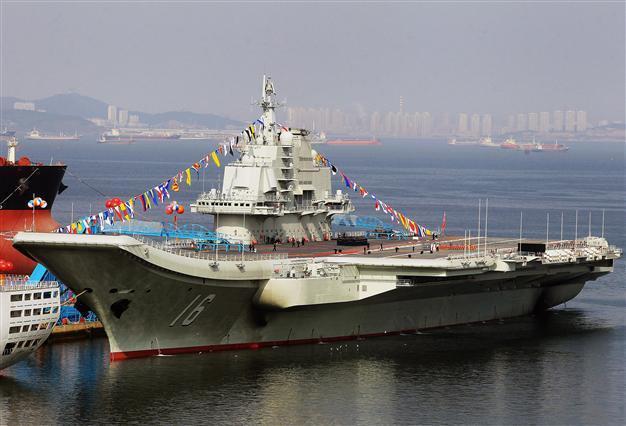China's first aircraft carrier enters service
BEIJING - Agence France-Presse

The carrier, built on former Ukrainian vessel Varyag, was officially named as Liaoning after being delivered to the Chinese navy, according to state media. EPA Photo
China put its first aircraft carrier into service today, in a show of strength that came as territorial disputes over strategic islands in the region escalated.
China is locked in a row with Japan over Tokyo-controlled islands in the East China Sea, where the Japanese coastguard duelled Tuesday with dozens of Taiwanese vessels which intruded into territorial waters.
Both sides fired water cannon as the flotilla, escorted by Taiwanese coastguard ships, sailed towards the islands known as the Senkakus in Japan, and the Diaoyu in China.
The latest escalation in the row over control of the islands came as China's leaders attended a commissioning ceremony for the 300-metre aircraft, a former Soviet ship that was bought from Ukraine.
The carrier was named the Liaoning after the northeastern province that is home to China's main naval port city of Dalian, where it was extensively refitted.
The commissioning makes China the last permanent member of the United Nations Security Council to have an aircraft carrier, and comes as Beijing's political and economic clout grows.
Numerous sea trials of the carrier were met with concern from regional powers including Japan and the United States, which called on Beijing to explain why it needed such a vessel.
"The PLA's general armament department, the navy and all comrades participating in the carrier program should make new contributions in promoting China's weaponry construction and safeguarding national sovereignty, security and territorial integrity," Premier Wen Jiabao said at the ceremony in Dalian.
"It will also be of great significance in enhancing national defence power and the country's comprehensive strength," Wen added.
The US has played down the importance of the aircraft carrier, saying following its first sea trial in August 2011 that it had "limited" capability.
But the Pentagon also said the vessel was the first step towards a future fleet of carriers expected to be built domestically in coming years.
Taiwan's intelligence chief said earlier this year that China has decided to build two aircraft carriers. However despite rumours that work has already begun, there is no evidence of construction of a domestically-built carrier.
Beijing confirmed last year it was revamping the former Soviet ship -- originally called the Varyag -- and has repeatedly insisted it poses no threat to its neighbours.
It says the ship will mainly be used for training and development purposes, but military commentators say China is developing strike aircraft and support vessels which would help the ship become fully operational.
Pictures have been published in the Chinese press showing domestically-built planes on the carrier's deck.
Leading generals have also said that developing strike aircraft for China's navy is a top priority for military bosses.
"Having the aircraft carrier enter the ranks will be of important significance in raising the overall fighting capacity of our nation's navy to a modern level," the defence ministry said.
It "will be effective in defending the interests of state sovereignty, security and development and advancing world peace and common development".
The ministry also said the vessel will increase China's capacity to defend itself and "cooperate on the high seas in dealing with non-traditional security threats".
Tuesday's large-scale breach of what Japan considers sovereign territory complicates an already volatile territorial dispute with China, which is also locked in a separate row over the strategic South China Sea against claims by several nations including the Philippines.
Relations between Japan and China have scraped long-unseen lows in recent weeks following Tokyo's nationalisation of three of the East China Sea islands, which it bought from a private Japanese landowner.
Several days of sometimes violent protests erupted in cities across China, where Japanese businesses were targeted by rioters.
In high-level talks over the rival claims Tuesday, China told Japan it "must abandon any illusion" and that it will "absolutely not tolerate" violations of sovereignty.
In Tuesday's incident, a dozen Taiwanese coastguard and 40 fishing boats spent several hours in Japanese waters, the Japan Coast Guard said. The boats, flying Taiwan flags left a port in northeast Taiwan on Monday with 300 fishermen on board -- vowing to stake their claim to islands where they say they have ancestral fishing rights.
Japan administers the uninhabited, but strategically well-positioned archipelago. Beijing says it has owned the islands for centuries. Taiwan also claims the islands, which lie around 200 kilometres (125 miles) from its coast.
